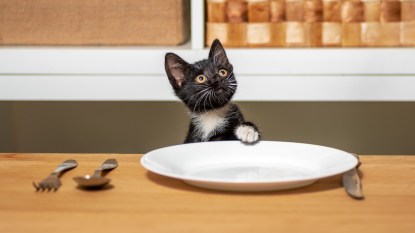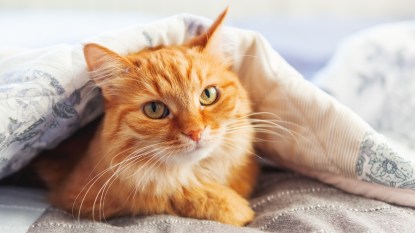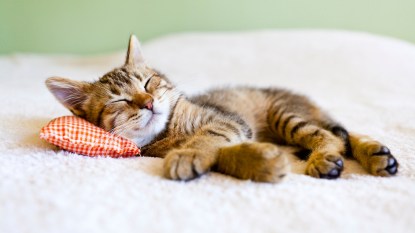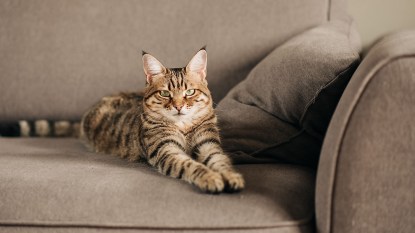Why Does My Cat Lay On Me? Vets Reveal the 4 Reasons That’ll Make You Feel Extra-Loved
And what to do if your cat isn't so cuddly.
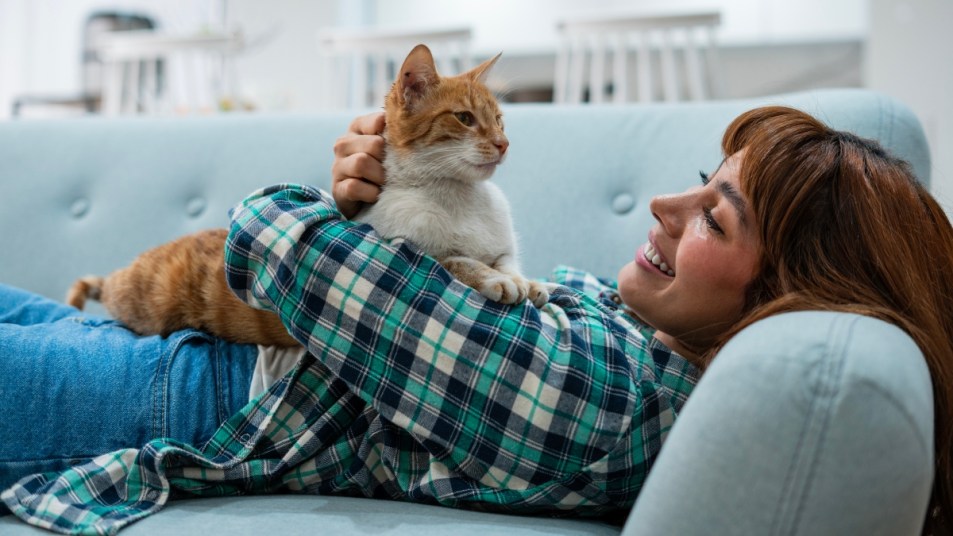
Cats have a reputation for being finicky, so it always fills us with a little glee when they lay on our chest when we’re reading in bed or plop down in our lap while we’re watching TV. After all, being chosen by your cat is one of the best feelings in the world. While it’s easy to assume she does this because she loves you (which she does!), there are other reasons your cat lays on you that may be even more flattering. We asked veterinarians and cat behaviorists for the reasons behind this adorable behavior — keep reading to see what they say.
Why does my cat lay on me?
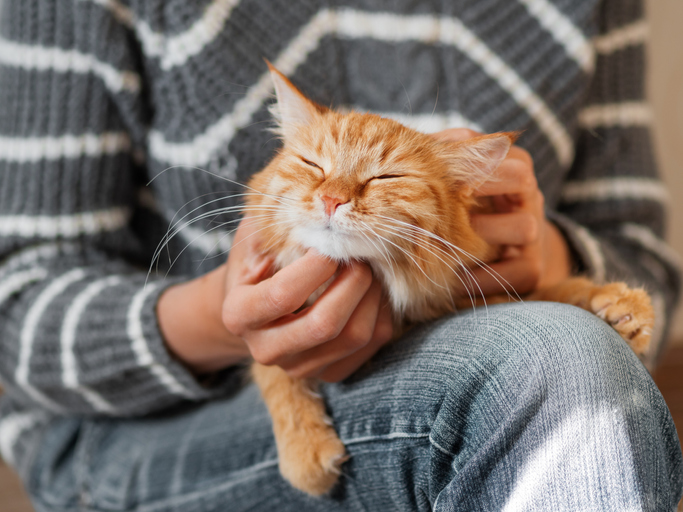
Cats have minds of their own, and there are a lot of mysteries behind why they do the things they do. Vets share four top reasons, however, that your kitty may be curling up on you all the time.
1. She wants to soak up some heat
One of the main reasons your cat may cuddle up to you is to seek warmth. “With a body temperature that’s naturally higher than humans’, cats may seek the comfort of our body heat to regulate their own,” says Emma Fulton, senior veterinarian contributor to Whisker Witty. While our average temperature sits around 98.6°F, cats’ usual body temperature is around 102°F, so they often crave external heat sources to keep their temps up. It’s the same reason cats love laying in sunbeams and near heaters — they prefer to stay cozy.
2. She wants to feel safe
Another reason your cat curls up on you is because you make her feel secure. She associates closeness to you with safety and protection from any possible threats, and feeling secure lets her relax and catch some zzz’s. “The close proximity to their beloved human provides a safe environment, and they feel comforted by the rhythm of our breathing and heartbeat,” says Fulton.
“Like children find comfort from caregivers, cats may see us as a source of safety,” adds Dr. Sara Ochoa, veterinary contributor to Hound Games. Although our pet cats would be considered predators if they lived in the wild, it’s important to remember they would also be prey due to their small size. How sweet is it that they trust us enough to keep them safe from dangers — even if the nearest “predator” is just a stuffed animal or a balloon?
3. She’s claiming her territory
If your cat lays on top of you, especially when there are other humans and pets nearby, she may be claiming you as her territory. “Cats have an inherent territorial behavior,” says Fulton. “When they lay on us, they subtly mark us with their scent, asserting their presence and claim.” By curling up on you, your cat is communicating to everyone else nearby that you are hers, and no one else should try to come in between you.
“Given the cat’s territorial behavior, if a cat chooses to sleep with you, this means you are ‘their person,'” adds Dr. Paola Cuevas, MVZ, behaviorist and veterinarian consultant for Pet Keen. If that’s not flattering, what is?
4. She’s seeking some affection
The most adorable reason your cat lays on top of you is simply because she loves you. “Emotionally, resting on us can be an overt gesture of affection, trust and the bond they share with their human companion,” says Fulton. A cat’s strong sense of smell might also explain why they cozy up to us in such a close way. Cats may follow their noses until they find a familiar scent when they need companionship. Sniff, sniff … so they do love us after all! (Click through to see the adorable reasons they lick your hair, too.)
Is this behavior ever a cause for concern?
If your cat has always been cuddly, and you enjoy it, then there isn’t a problem with your cat laying on top of you. But there are instances in which a cat can be too cuddly, and intervention is recommended.
“If your cat’s excessive clinginess disrupts your routine, it could be a sign to set some boundaries,” says Dr. Ochoa. Additionally, if your cat is usually independent and has only recently begun to lay on you, it may be worth consulting your vet. “If an independent cat suddenly gets very attached, it might indicate anxiety or health issues, and it’s worth having a vet take a look.”
What it means if your cat doesn’t lay on you
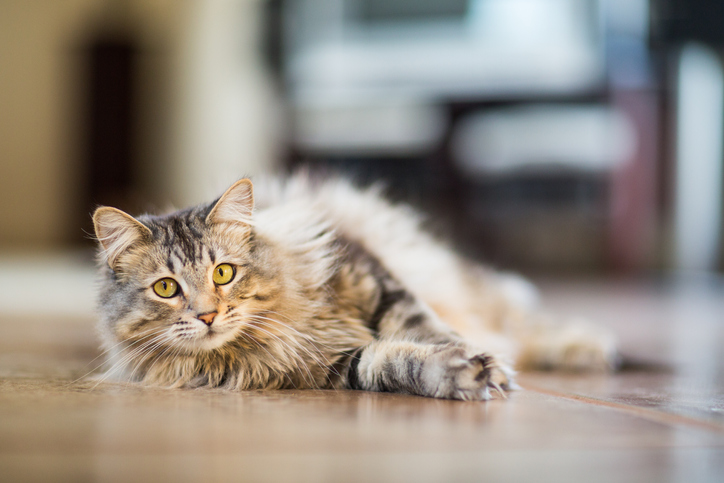
Cats are known for being independent by nature. If your kitty doesn’t cuddle with you, don’t assume it’s because she doesn’t love you. “Each feline has its own personality. Lack of cuddling doesn’t necessarily mean lack of love,” says Dr. Ochoa. “Some cats show affection in other ways we humans might not expect.”
Aside from cuddling, cats can show affection through purring, eye contact, head-butting and even body language like tail position. Just like humans, cats express their love in a variety of ways.
They might also simple favor other modes of relaxation. “They may prefer other areas of the houe, like a cozy bed, a sunlit window or even a secluded corner,” says Fulton. “Factors such as the temperature of the environment might also influence their decision; if they’re already warm, they may not seek additional heat.”
“Just remember — cats are not dogs, and in most cases, they will be cuddly on their own terms,” says Dr. Cuevas. “It is your cat who gets to choose the time, place and amount of cuddles. No matter what, though, you will forever be their human.”
Can non-cuddly cats become cuddly?
Yes and no. “You can’t force a cat to be cuddly if it’s just not in their nature,” says Dr. Ochoa. “But some things may encourage closeness, like set routines of quality time together to build trust.” She also recommends creating comfortable, cozy spots near you to get her to come close, like setting a cat bed next to your favorite reading spot.
“When they do come close, reinforcing this behavior with treats or gentle praise can encourage repeat occurrences,” says Fulton. “However, it’s paramount to always respect your cat’s boundaries. Not all cats will evolve into lap cats, and that’s alright. Focus on alternative bonding activities, such as play sessions or grooming, which can also enhance your relationship.”
Want to learn more about your cat? Check out the stories below.
Can Cats Tell When We’re Stressed? Here’s Proof That They Can — and How It Affects Them
Can Cats Eat Bacon? Vets Reveal Which Brunch Foods Your Kitty Can Enjoy
Why Cats Make Biscuits — Vets Reveal the Cute Reasons Behind Their Need to Knead
Cat Trilling: Vets Reveal the Secret Message Behind Those Cute Kitty Chirps
Does Your Cat Hold a Grudge? Vets Reveal Just What’s Behind That Grumpy Puss
The World’s Smallest Cat Breeds Are Big-Time Adorable — Here Are Photos to Prove It





